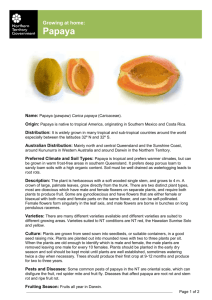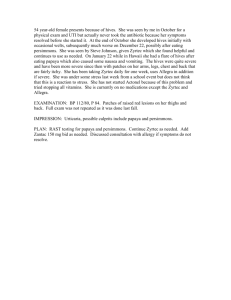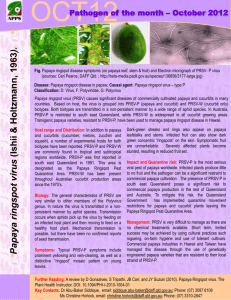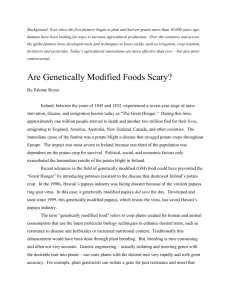Papaya and Green Tea Team Up to Prevent Prostate Cancer
advertisement
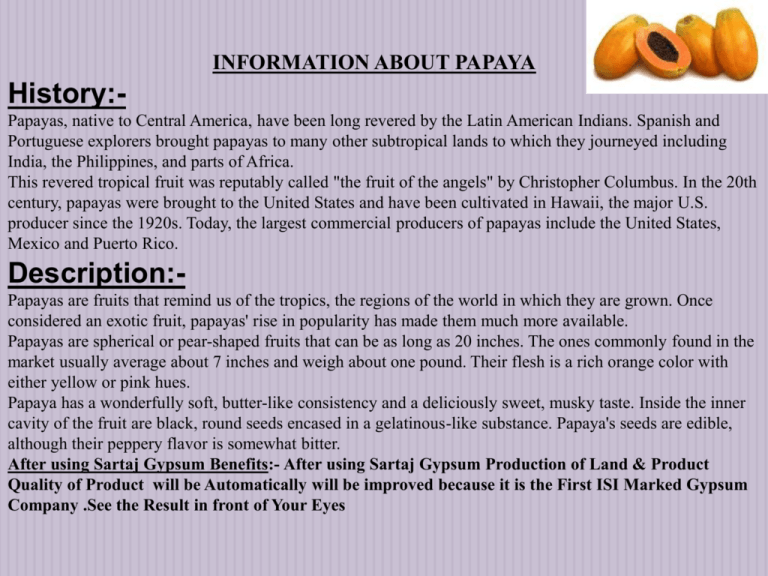
INFORMATION ABOUT PAPAYA History:Papayas, native to Central America, have been long revered by the Latin American Indians. Spanish and Portuguese explorers brought papayas to many other subtropical lands to which they journeyed including India, the Philippines, and parts of Africa. This revered tropical fruit was reputably called "the fruit of the angels" by Christopher Columbus. In the 20th century, papayas were brought to the United States and have been cultivated in Hawaii, the major U.S. producer since the 1920s. Today, the largest commercial producers of papayas include the United States, Mexico and Puerto Rico. Description:Papayas are fruits that remind us of the tropics, the regions of the world in which they are grown. Once considered an exotic fruit, papayas' rise in popularity has made them much more available. Papayas are spherical or pear-shaped fruits that can be as long as 20 inches. The ones commonly found in the market usually average about 7 inches and weigh about one pound. Their flesh is a rich orange color with either yellow or pink hues. Papaya has a wonderfully soft, butter-like consistency and a deliciously sweet, musky taste. Inside the inner cavity of the fruit are black, round seeds encased in a gelatinous-like substance. Papaya's seeds are edible, although their peppery flavor is somewhat bitter. After using Sartaj Gypsum Benefits:- After using Sartaj Gypsum Production of Land & Product Quality of Product will be Automatically will be improved because it is the First ISI Marked Gypsum Company .See the Result in front of Your Eyes Health Benefits:Papayas offer not only the luscious taste and sunlit color of the tropics, but are rich sources of antioxidant nutrients such as carotenes, vitamin C and flavonoids; the B vitamins, folate and pantothenic acid; and the minerals, potassium, copper, and magnesium; and fiber. Together, these nutrients promote the health of the cardiovascular system and also provide protection against colon cancer. In addition, papaya contains the digestive enzyme, papain, which is used like bromelain, a similar enzyme found in pineapple, to treat sports injuries, other causes of trauma, and allergies. Protection Against Heart Disease:Papayas may be very helpful for the prevention of atherosclerosis and diabetic heart disease. Papayas are an excellent source of the powerful antioxidants vitamin C and vitamin A (through their concentration of provitamin A carotenoid phytonutrients). These nutrients help prevent the oxidation of cholesterol. Only when cholesterol becomes oxidized is it able to stick to and build up in blood vessel walls, forming dangerous plaques that can eventually cause heart attacks or strokes. One way in which dietary vitamin E and vitamin C may exert this effect is through their suggested association with a compound called paraoxonase, an enzyme that inhibits LDL cholesterol and HDL cholesterol oxidation. Papayas are also a good source of fiber, which has been shown to lower high cholesterol levels. The folic acid found in papayas is needed for the conversion of a substance called homocysteine into benign amino acids such as cysteine or methionine. If unconverted, homocysteine can directly damage blood vessel walls and, if levels get too high, is considered a significant risk factor for a heart attack or stroke. Promotes Digestive Health The nutrients in papaya have also been shown to be helpful in the prevention of colon cancer. Papaya's fiber is able to bind to cancer-causing toxins in the colon and keep them away from the healthy colon cells. In addition, papaya's folate, vitamin C, beta-carotene, and vitamin E have each been associated with a reduced risk of colon cancer. These nutrients provide synergistic protection for colon cells from free radical damage to their DNA. Increasing your intake of these nutrients by enjoying papaya is an especially good idea for individuals at risk of colon cancer. Anti-Inflammatory Effects Papaya contains several unique protein-digesting enzymes including papain and chymopapain. These enzymes have been shown to help lower inflammation and to improve healing from burns. In addition, the antioxidant nutrients found in papaya, including vitamin C and beta-carotene, are also very good at reducing inflammation. This may explain why people with diseases that are worsened by inflammation, such as asthma, osteoarthritis, and rheumatoid arthritis, find that the severity of their condition is reduced when they get more of these nutrients. Immune Support Vitamin C and vitamin A, which is made in the body from the beta-carotene in papaya, are both needed for the proper function of a healthy immune system. Papaya may therefore be a healthy fruit choice for preventing such illnesses as recurrent ear infections, colds and flu. Protection against Macular Degeneration:Your mother may have told you carrots would keep your eyes bright as a child, but as an adult, it looks like fruit is even more important for keeping your sight. Data reported in a study published in the Archives of Ophthalmologyindicates that eating 3 or more servings of fruit per day may lower your risk of age-related macular degeneration (ARMD), the primary cause of vision loss in older adults, by 36%, compared to persons who consume less than 1.5 servings of fruit daily. In this study, which involved over 110,000 women and men, researchers evaluated the effect of study participants' consumption of fruits; vegetables; the antioxidant vitamins A, C, and E; and carotenoids on the development of early ARMD or neovascular ARMD, a more severe form of the illness associated with vision loss. While, surprisingly, intakes of vegetables, antioxidant vitamins and carotenoids were not strongly related to incidence of either form of ARMD, fruit intake was definitely protective against the severe form of this vision-destroying disease. Three servings of fruit may sound like a lot to eat each day, but papaya can help you reach this goal. Add slices of fresh papaya to your morning cereal, lunch time yogurt or green salads. Cut a papaya in half and fill with cottage cheese, crab, shrimp or tuna salad. For an elegant meal, place slices of fresh papaya over any broiled fish. Protection against Rheumatoid Arthritis:While one study suggests that high doses of supplemental vitamin C makes osteoarthritis, a type of degenerative arthritis that occurs with aging, worse in laboratory animals, another indicates that vitamin Crich foods, such as papaya, provide humans with protection against inflammatory polyarthritis, a form of rheumatoid arthritis involving two or more joints. The findings, presented in the Annals of the Rheumatic Diseases were drawn from a study of more than 20,000 subjects and focused on subjects who developed inflammatory polyarthritis and similar subjects who remained arthritis-free during the follow-up period. Subjects who consumed the lowest amounts of vitamin C-rich foods were more than three times more likely to develop arthritis than those who consumed the highest amounts. Papaya and Green Tea Team Up to Prevent Prostate Cancer:Choosing to regularly eat lycopene-rich fruits, such as papaya, and drink green tea may greatly reduce a man's risk of developing prostate cancer, suggests research published the Asia Pacific Journal of Clinical Nutrition (Jian L, Lee AH, et al.) In this case-control study involving 130 prostate cancer patients and 274 hospital controls, men drinking the most green tea were found to have an 86% reduced risk of prostate cancer compared, to those drinking the least. A similar inverse association was found between the men's consumption of lycopene-rich fruits and vegetables such as tomatoes, apricots, pink grapefruit, watermelon, papaya, and guava. Men who most frequently enjoyed these foods were 82% less likely to have prostate cancer compared to those consuming the least lycopene-rich foods. Regular consumption of both green tea and foods rich in lycopene resulted in a synergistic protective effect, stronger than the protection afforded by either, the researchers also noted. Practical Tips: Get in the habit of drinking green tea and eating lycopene-rich foods. •Take a quart of iced green tea to work and sip throughout the day or take it to the gym to provide prostate protection while replenishing fluids after your workout. •Pack a ziploc bag of apricots and almonds in your briefcase or gym bag for a handy snack. •Start your breakfast with a half grapefruit or a glass of papaya or guava juice. •Add papaya to any smoothie or fruit salad or use as a delectable garnish for fish. •For a delicious summer lunch, cut a papaya in half, scoop out the seeds, sprinkle with lime juice and top with cottage cheese, a fresh mint leaf, and roasted almonds. •Begin lunch or dinner with some spicy tomato juice on the rocks with a twist of lime. Snack on tomato crostini: in the oven, toast whole wheat bread till crusty, then top with tomato sauce, herbs, a little grated cheese, and reheat until the cheese melts. •Top whole wheat pasta with olive oil, pine nuts, feta cheese and a rich tomato sauce for lunch or dinner.

